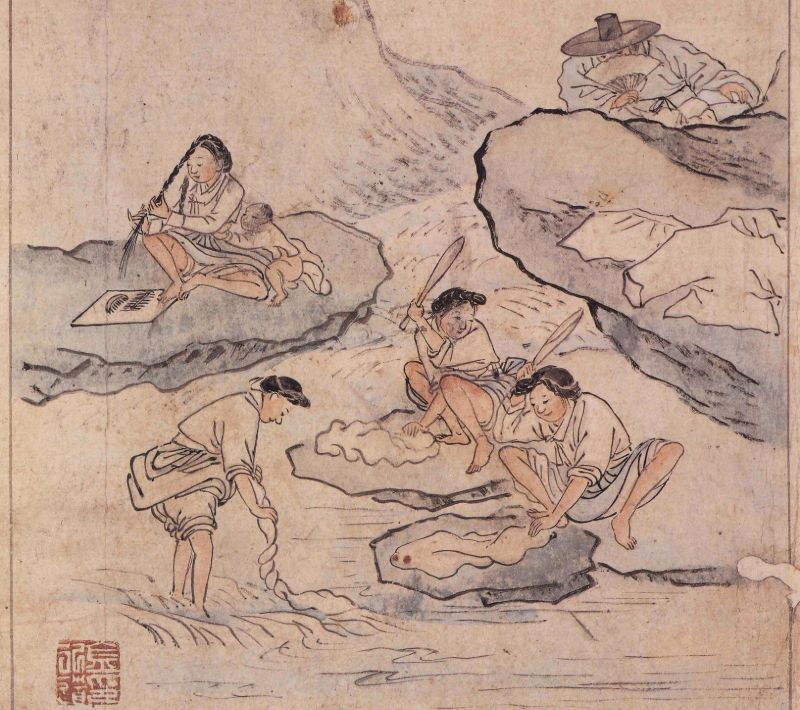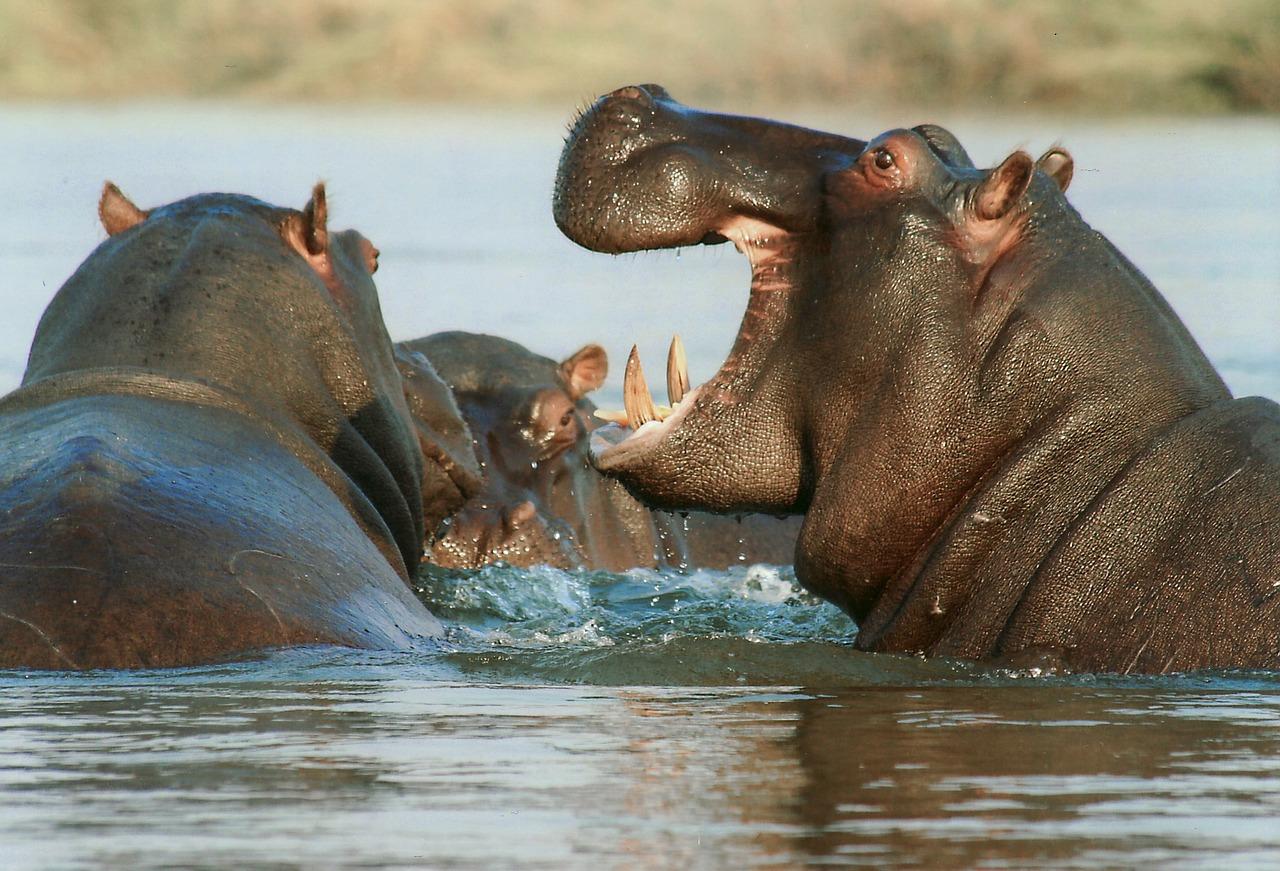Popular Nigerian Folktales

Hold up! This is a story session. Who doesn’t love a good story session? Everybody does. This is why from generation to generation, we have had several stories that aim to explain everyday experiences. These stories are called Folktales.
Folktales refers to tales or stories that form the oral tradition of a particular group of people. They reflect the cultural identity and disposition of a particular cultural group. They served as tools of education as well as entertainment.

Every cultural group around the world has their own folktales that aims to present their own worldview and in this article, we’ll be looking at a few of these tales from different cultures. Let’s go!
Popular Nigerian Folktales #001
This folktale is a Nigerian folktale about ‘Why the Hippopotamus lives in water’ taken from fairytales.com;

“Many years ago the hippopotamus, whose name was Isantim, was one of the biggest kings on the land; he was second only to the elephant. The hippo had seven large fat wives, of whom he was very fond. Now and then he used to give a big feast for the people, but the curious thing was that, although everyone knew the hippo, no one, except this seven wives, knew his name.
At one of the feasts, just as the people were about to sit down, the hippo said, “You have come to feed at my table, but none of you know my name. If you cannot tell my name, you shall all go away without your dinner.
As they could not guess his name, they had to go away and leave all the good food and tombo behind them. But before they left, the tortoise stood up and asked the hippopotamus what he would do if he told him his name at the next feast? So the hippo replied that he would be so ashamed of himself, that he and his whole family would leave the land, and for the future would dwell in the water.
Now it was the custom for the hippo and his seven wives to go down every morning and evening to the river to wash and have a drink. Of this custom, the tortoise was aware. The hippo used to walk first, and the seven wives followed.
One day when they had gone down to the river to bathe, the tortoise made a small hole in the middle of the path, and then waited. When the hippo and his wives returned, two of the wives were some distance behind, so the tortoise came out from where he had been hiding, and half buried himself in the hole he had dug, leaving the greater part of his shell exposed. When the two hippo wives came along, the first one knocked her foot against the tortoise’s shell, and immediately called out to her husband, “Oh! Isantim, my husband, I have hurt my foot.” At this the tortoise was very glad, and went joyfully home, as he had found out the hippo’s name.
When the next feast was given by the hippo, he made the same condition about his name; so the tortoise got up and said, “You promise you will not kill me if I tell you your name?” and the hippo promised. The tortoise then shouted as loud as he was able, “Your name is ISANTIM!!!,” at which a cheer went up from all the people, and then they sat down to their dinner.
When the feast was over, the hippo, with his seven wives, in accordance with his promise, went down to the river, and they have always lived in the water from that day till now; and although they come on shore to feed at night, you will never find a hippo on the land in the daytime.
Beautiful story, isn’t it?
Popular Nigerian Folktales #002
Another Nigerian folktale aims to explain Why the Sun and the Moon lives in the Sky. A crazy attempt but let’s have a look.

“Many years ago the sun and water were great friends, and both lived on the earth together. The sun very often used to visit the water, but the water never returned his visits. At last the sun asked the water why it was that he never came to see him in his house, the water replied that the sun’s house was not big enough, and that if he came with his people he would drive the sun out.
He then said, “If you wish me to visit you, you must build a very large compound; but I warn you that it will have to be a tremendous place, as my people are very numerous, and take up a lot of room.”
The sun promised to build a very big compound, and soon afterwards he returned home to his wife, the moon, who greeted him with a broad smile when he opened the door. The sun told the moon what he had promised the water, and the next day commenced building a huge compound in which to entertain his friend.
When it was completed, he asked the water to come and visit him the next day.
When the water arrived, he called out to the sun, and asked him whether it would be safe for him to enter, and the sun answered, “Yes, come in, my friend.”
The water then began to flow in, accompanied by the fish and all the water animals.
Very soon the water was knee-deep, so he asked the sun if it was still safe, and the sun again said, “Yes,” so more water came in.
When the water was level with the top of a man’s head, the water said to the sun, “Do you want more of my people to come?” and the sun and moon both answered, “Yes,” not knowing any better, so the water flowed on, until the sun and moon had to perch themselves on the top of the roof.
Again the water addressed the sun, but receiving the same answer, and more of his people rushing in, the water very soon overflowed the top of the roof, and the sun and moon were forced to go up into the sky, where they have remained ever since.”

This is a beautiful story. I do not care about it’s accuracy.
Popular Nigerian Folktales #003
We move on to the Southern part of Africa with this South-African folktale of ‘How the Jackal got his Stripes’ culled from worldoftales.com
“The Sun was a strange little child,” said Outa. “He never had any Pap-pa or Mam-ma. No one knew where he came from. He was found by the roadside.
“In the olden days when the men of the Ancient Race—the old, old people that lived so long ago—were trekking in search of game, they heard a little voice calling, calling. It was not a springbokkie, it was not a tarentaal, it was not a little ostrich. They couldn’t think what it was. But it kept on, it kept on.” Outa’s head nodded in time to his repetitions.
“Why didn’t they go and look?” asked Willem.
“They did, my baasje. They hunted about amongst the milk-bushes by the roadside, and at last under one of them they found a nice brown baby. He was lying quite still looking about him, not like a baby, baasjes, but like an old child, and sparks of light, as bright as the sparks from Outa’s tinderbox, seemed to fly out of his eyes. When he saw the men, he began calling again.
“‘Carry me, carry me! Pick me up and carry me!’
“‘Arré! he can talk,’ said the man. ‘What a fine little child! Where have your people gone? and why did they leave you here?’
“But the little Sun wouldn’t answer them. All he said was, ‘Put me in your awa-skin. I’m tired; I can’t walk.’
“One of the men went to pick him up, but when he got near he said, ‘Soe! but he’s hot; the heat comes out of him. I won’t take him.’
“‘How can you be so silly?’ said another man. ‘I’ll carry him.’
“But when he got near, he started back. ‘Alla! what eyes! Fire comes out of them.’ And he, too, turned away.
“Then a third man went. ‘He is very small,’ he said; ‘I can easily put him in my awa-skin.’ He stooped and took the little Sun under his arms.
“‘Ohé! ohé! ohé!’ he cried, dropping the baby on to the red sand. ‘What is this for toverij! It is like fire under his arms. He burns me when I take him up.’
“The others all came round to see. They didn’t come too near, my baasjes, because they were frightened, but they wanted to see the strange brown baby that could talk, and that burned like a fire.
“All on a sudden he stretched himself; he turned his head and put up his little arms. Bright sparks flew from his eyes, and yellow light streamed from under his arms, and—hierr, skierr—the Men of the Early Race fell over each other as they ran through the milk-bushes back to the road. My! but they were frightened!
“The women were sitting there with their babies on their backs, waiting for their husbands.
‘Come along! Hurry! hurry! See that you get away from here,’ said the men, without stopping.
The women began to run, too.
‘What was it? What did you find?’
“‘A terrible something,’ said the men, still running. ‘It pretends to be a baby, but we know it is a mensevreter. There it lies in the sand, begging one of us to pick it up and put it in his awa-skin, but as soon as we go near, it tries to burn us; and if we don’t make haste and get away from here, it will certainly catch us.’
“Then they ran faster than ever. Baasjes know—ach no!” corrected Outa, with a sly smile; “Outa means baasjes don’t know—how frightenness makes wings grow on people’s feet, so that they seem to fly. So the Men of the Early Race, and the women with their babies on their backs, flew, and very soon they were far from the place where the little Sun was lying.
“But someone had been watching, my baasjes, watching from a bush near by. It was Jakhals, with his bright eyes and his sharp nose, and his stomach close to the ground. When the people had gone, he crept out to see what had made them run. Hardly a leaf stirred, not a sound was heard, so softly he crept along under the milk-bushes to where the little Sun lay.
“‘Ach, what a fine little child has been left behind by the men!’ he said. ‘Now that is really a shame—that none of them would put it into his awa-skin.’
“‘Carry me, carry me! Put me in your awa-skin,’ said the little Sun.
“‘I haven’t got an awa-skin, baasje,’ said Jakhals, ‘but if you can hold on, I’ll carry you on my back.’
“So Jakhals lay flat on his stomach, and the little Sun caught hold of his maanhaar, and rolled round on his back.
“‘Where do you want to go?’ asked Jakhals.
“‘There, where it far is,’ said the baby, sleepily.
“Jakhals trotted off with his nose to the ground and a sly look in his eye. He didn’t care where the baby wanted to go; he was just going to carry him off to the krantz where Tante and the young Jakhalses lived. If baasjes could have seen his face! Alle wereld! he was smiling, and when Oom Jakhals smiles, it is the wickedest sight in the world. He was very pleased to think what he was taking home; fat brown babies are as nice as fat sheep-tails, so he went along quite jolly.
But only at first. Soon his back began to burn where the baby’s arms went around it. The heat got worse and worse, until he couldn’t hold it out any longer.
“‘Soe! Soe! Baasje burns me,’ he cried. ‘Sail down a little further, baasje, so that my neck can get cool.’
“The little Sun slipped further down and held fast again, and Jakhals trotted on.
“But soon he called out again, ‘Soe! Soe! Now the middle of my back burns. Sail down still a little further.’
The little Sun went further down and held fast again. And so it went on. Every time Jakhals called out that he was burning, the baby slipped a little further, and a little further, till at last he had hold of Jakhals by the tail, and then he wouldn’t let go. Even when Jakhals called out, he held on, and Jakhals’s tail burnt and burnt. My! it was quite black!
“‘Help! help!’ he screamed! ‘Ach, you devil’s child! Get off! Let go! I’ll punish you for this! I’ll bite you! I’ll gobble you up! My tail is burning! Help! Help!’ And he jumped, and bucked, and rushed about the veld, till at last the baby had to let go.
“Then Jakhals jumped round, and ran at the little Sun to bite him and gobble him up. But when he got near, a funny thing happened, my baasjes. Yes truly, just when he was going to bite, he stopped halfway, and shivered back as if someone had beaten him. At first he had growled with crossness, but now he began to whine from fright.
“And why was it, my baasjes? Because from under the baby’s arms streamed brightness and hotness, and out of the baby’s eyes came streaks of fire, so that Jakhals winked and blinked, and tried to make himself small in the sand. Every time he opened his eyes a little, just like slits, there was the baby sitting straight in front of him, staring at him so that he had to shut them again quick, quick.
“‘Come and punish me,’ said the baby.
“‘No, baasje, ach no!’ said Jakhals in a small, little voice, ‘why should I punish you?’
“‘Come and bite me,’ said the baby.
“‘No, baasje, no, I could never think of it.’ Jakhals made himself still a little smaller in the sand.
“‘Come and gobble me up,’ said the baby.
“Then Jakhals gave a yell and tried to crawl further back.
“‘Such a fine little child,’ he said, trying to make his voice sweet, ‘who would ever do such a wicked thing?’
“‘You would,’ said the little Sun. ‘When you had carried me safely to your krantz, you would have gobbled me up. You are touch so clever, Jakhals, but sometimes you will meet your match. Now, look at me well.’
“Jakhals didn’t want to look, my baasjes, but it was just as if something made his eyes go open, and he lay there staring at the baby, and the baby stared at him—so, my baasjes, just so”—Outa stretched his eyes to their utmost and held each fascinated child in turn.
“‘You’ll know me again when you see me,’ said the baby, ‘but never, never again will you be able to look me in the face. And now you can go.’
“Fierce light shot from his eyes, and he blew at Jakhals with all his might; his breath was like a burning flame, and Jakhals, half dead with fright, gave a great howl and fled away over the vlakte.
“From that day, my baasjes, he has a black stripe right down his back to the tip of his tail. And he cannot bear the Sun, but hides away all day with shut eyes, and only at night when the Old Man with the bright armpits has gone to sleep, does he come out to hunt and look for food, and play tricks on the other animals.”

Many of these folktales carry their own magic. Did you enjoy them? I sure did! Want to read more? This, Queen Nzinga, although not a folktale, is also a great read on african history. Enjoy!
ImageSource: pixabay provides for free commercial use and no attribution is required.
She's an African, Afro-American breed. She's way too radical in her writing style. She adds in a little childish nature to the mix, representing all you want to be but can't.

